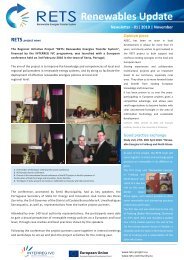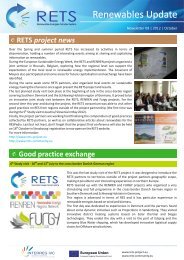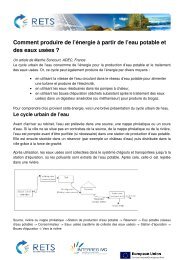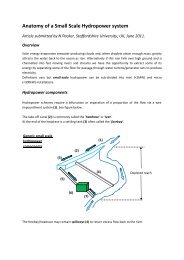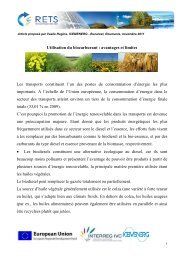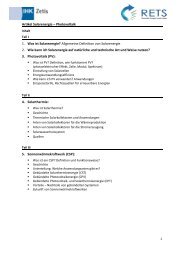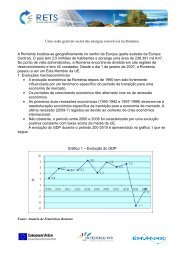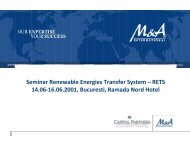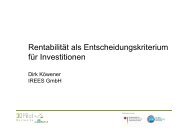Promoting renewable energies - RETS Project
Promoting renewable energies - RETS Project
Promoting renewable energies - RETS Project
Create successful ePaper yourself
Turn your PDF publications into a flip-book with our unique Google optimized e-Paper software.
c. The Green-Net project of Sittard- Geleen,<br />
Netherlands<br />
Private sector support schemes<br />
Publicly funded schemes to assist and develop the<br />
private sector take many forms and usually include a<br />
range of possible assistance for the firms. Such schemes<br />
are important to move the technologies and practices<br />
closer to market and to build overall confidence. The<br />
ultimate aim should be a flourishing private sector<br />
providing the services at a local level.<br />
Interventions include:<br />
cheap of free feasibility studies;<br />
soft loans or grants for installation;<br />
development of local supply chains;<br />
assistance with market research;<br />
new technology development;<br />
subsidised internships;<br />
knowledge transfer between universities and<br />
businesses (e.g. innovation vouchers);<br />
the use of cluster policy.<br />
More recently within business and innovation support<br />
there has been a movement away from supply led<br />
strategies (tightly defined by the programme managers<br />
allowable activities) to demand led strategies (more<br />
flexible programmes which support what the company<br />
has identified as needing).<br />
<strong>RETS</strong> project examples of private sector support<br />
schemes include:<br />
a. Pole of competitiveness Derbi, Languedoc<br />
Roussillon, France.<br />
b. The New Energy Sources Entrepreneurs’<br />
Association - SunE, Bucharest-Ilfov, Romania.<br />
would seem to be desirable but there are few such<br />
courses in general.<br />
Training can cover all levels of skills and training such as:<br />
training people to install and maintain <strong>renewable</strong><br />
technologies;<br />
to accredit existing skilled trades people;<br />
to provide confidence to consumers through<br />
certification schemes;<br />
the provision of undergraduate and postgraduate<br />
courses in technical and research orientated<br />
<strong>renewable</strong> energy at local universities;<br />
community organisations providing information on<br />
energy efficiency and grants.<br />
<strong>RETS</strong> project examples include<br />
a. Climate change Wales project to assist teachers<br />
and students in Wales.<br />
b. A Masters programme in “Management and Law in<br />
Renewable Energies and Sustainable Development”<br />
run at Strasbourg University, France.<br />
c. Professional training provided by Coprotec in<br />
France.<br />
In Chapter 5 we provide pen portraits of some for the<br />
best practices at the local level that have been gathered<br />
by the partners on the project. Full details of all practices<br />
are available on the main project website<br />
http://www.rets-project.eu<br />
The practices can be broadly divided into two main ways:<br />
By six different types of technology (biomass, waste,<br />
wind, hydro, geo, solar).<br />
By five different types of intervention (detailed above).<br />
Training, accreditation and education<br />
schemes.<br />
These are far less common as an intervention measure<br />
at a local authority level and are often carried out on the<br />
basis of one off projects rather than as part of a<br />
sustained training programme. Universities do provide<br />
both engineering courses as well as energy policy type<br />
courses. The development of hybrid postgraduate<br />
courses covering aspects of both engineering and policy<br />
<strong>RETS</strong> Compendium – © 2012 <strong>RETS</strong> Consortium<br />
39




